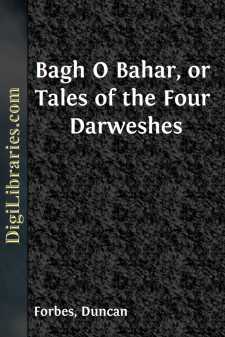Categories
- Antiques & Collectibles 13
- Architecture 36
- Art 48
- Bibles 22
- Biography & Autobiography 813
- Body, Mind & Spirit 142
- Business & Economics 28
- Children's Books 14
- Children's Fiction 11
- Computers 4
- Cooking 94
- Crafts & Hobbies 4
- Drama 346
- Education 46
- Family & Relationships 57
- Fiction 11828
- Games 19
- Gardening 17
- Health & Fitness 34
- History 1377
- House & Home 1
- Humor 147
- Juvenile Fiction 1873
- Juvenile Nonfiction 202
- Language Arts & Disciplines 88
- Law 16
- Literary Collections 686
- Literary Criticism 179
- Mathematics 13
- Medical 41
- Music 40
- Nature 179
- Non-Classifiable 1768
- Performing Arts 7
- Periodicals 1453
- Philosophy 64
- Photography 2
- Poetry 896
- Political Science 203
- Psychology 42
- Reference 154
- Religion 513
- Science 126
- Self-Help 84
- Social Science 81
- Sports & Recreation 34
- Study Aids 3
- Technology & Engineering 59
- Transportation 23
- Travel 463
- True Crime 29
Bagh O Bahar, or Tales of the Four Darweshes
by: Duncan Forbes
Description:
Excerpt
INTRODUCTION.
I now commence my tale; pay attention to it, and be just to its merits. In the "Adventures of the Four Darwesh, [43]" it is thus written, and the narrator has related, that formerly in the Empire of Rum [44] there reigned a great king, in whom were innate justice equal to that of Naushirwan, [45] and generosity like that of Hatim. [46] His name was Azad-Bakht, and his imperial residence was at Constantinople, [47] (which they call Istambol.) In his reign the peasant was happy, the treasury full, the army satisied, and the poor at ease. They lived in such peace and plenty, that in their homes the day was a festival, and the night was a shabi barat [48]. Thieves, robbers, pickpockets, swindlers, and all such as were vicious and dishonest, he utterly exterminated, and no vestige of them allowed he to remain in his kingdom. [49] The doors of the houses were unshut all night, and the shops of the bazar remained open. The travellers and wayfarers chinked gold as they went along, over plains and through woods; and no one asked them, "How many teeth have you in your mouth," [50] or "Where are you going?"
There were thousands of cities in that king's dominions, and many princes paid him tribute. Though he was so great a king, he never for a moment neglected his duties or his prayers to God. He possessed all the necessary comforts of this world; but male issue, which is the fruit of life, was not in the garden of his destiny, for which reason he was often pensive and sorrowful, and after the five [51] regulated periods of prayer, he used to address himself to his Creator and say, "O God! thou hast, through thy infinite goodness blest thy weak creature with every comfort, but thou hast given no light to this dark abode. [52] This desire alone is unaccomplished, that I have no one to transmit my name and support my old age. [53] Thou hast everything in thy hidden treasury; give me a living and thriving son, that my name and the vestiges of this kingdom may remain."
In this hope the king reached his fortieth year; when one day he had finished his prayers in the Mirror Saloon, [54] and while telling his beads, he happened to cast his eyes towards one of the mirrors, and perceived a white hair in his whiskers, which glittered like a silver wire; on seeing it, the king's eyes filled with tears, and he heaved a deep sigh, and then said to himself, "Alas! thou hast wasted thy years to no purpose, and for earthly advantages thou hast overturned the world. And all the countries thou hast conquered, what advantage are they to thee? Some other race will in the end squander these riches.
Death hath already sent thee a messenger; [55] and even if thou livest a few years, the strength of thy body will be less. Hence, it appears clearly from this circumstance, that it is not my destiny to have an heir to my canopy and throne. I must one day die, and leave everything behind me; so it is better for me to quit them now, and dedicate the rest of my days to the adoration of my Maker."
Having in his heart made this resolve, he descended to his lower garden....


